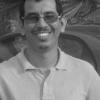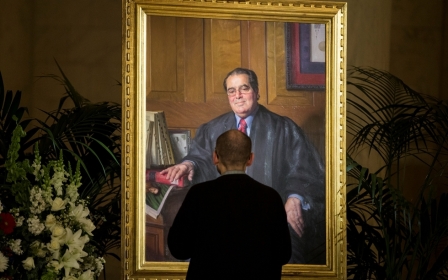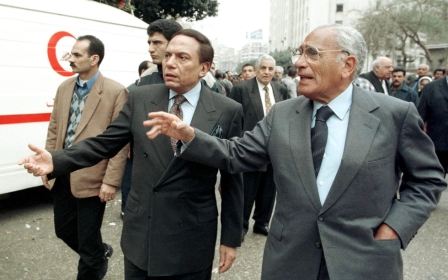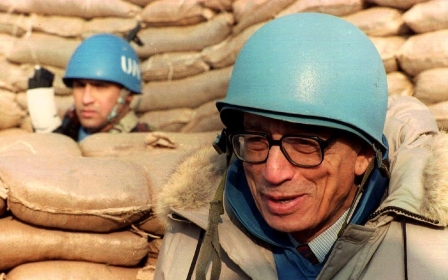The legacy of Sudan's Hassan al-Turabi
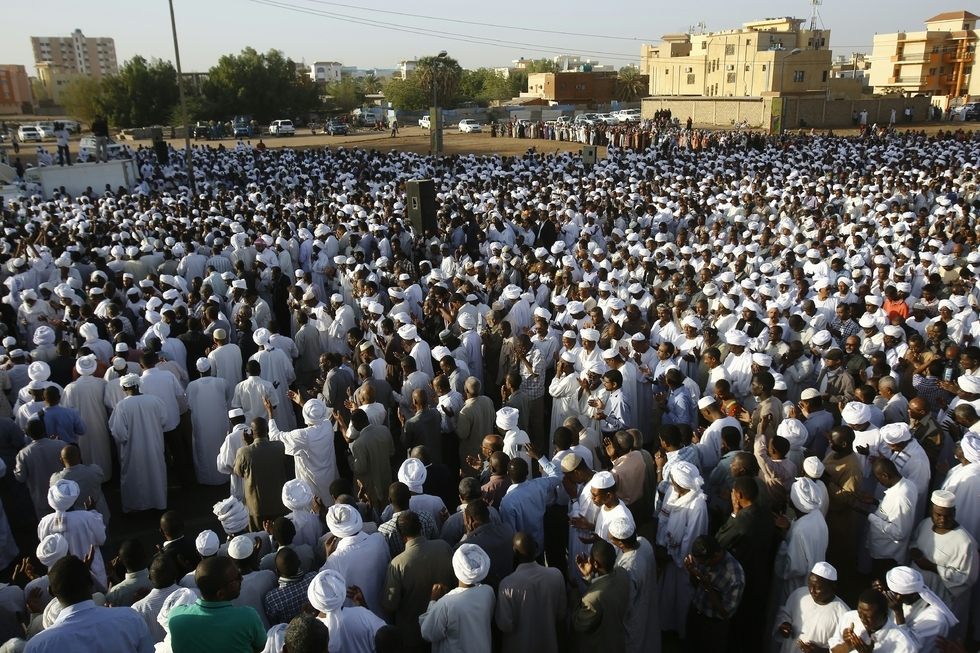
On Saturday the Arab world lost one of its most renowned scholars of the post-independence period. The controversial Sudanese academic and politician, Hassan al-Turabi, died at the age of 84.
Born in a small town in eastern Sudan to a conservative family, Turabi took, by all accounts, an unconventional trajectory in life. Unlike his father’s traditional Islamic learning, Turabi had a modern education, graduating with a degree in law in 1955 from the University of Khartoum, a master’s degree from Oxford in 1957, and finally, a PhD from Sorbonne in 1964.
Despite this educational background and his appointment as the dean of the college of law in Khartoum upon his return, it was his political involvement, not academic career, which ultimately coloured his fate.
Turabi seems to have gravitated to politics in his undergraduate years when he joined the local branch of the Muslim Brotherhood. However, it was not until after 1964 that Turabi became enmeshed in the political process, assuming the leadership of the Mithaq Front, a Muslim-Brotherhood heavy platform.
Turabi’s participation in the revolution of 1964 would prove to be the beginning of a tumultuous road that saw Turabi’s life sway between the glamour and prestige of public office and the darkness and isolation of imprisonment. In a career punctuated by long interludes of prison time, Turabi assumed high positions: the president’s advisor for foreign affairs, a minister of foreign affairs and the president of the Sudanese Parliament, among other sensitive positions.
As a politician, Turabi elicited both accolade and opprobrium. On the one hand, he strongly opposed the military dictators, which ran his the country from 1958 onward. But Turabi did, on the other hand, embrace and defend some of these very regimes, often opposing them at first and then striking deals to joining their governments.
One such controversial move was the Islamist alliance with the military rule of Jaafar al-Numayri from 1977 to 1985, which Turabi played a pivotal role in cementing. A more impactful and dramatic moment in Turabi’s life, however, came with the successful coup, which he orchestrated in 1989. Although Turabi in recent years took a critical perspective on the 1989 coup, it was the legacy of that coup that was most damaging, not just to Turabi, but also to the Islamists in general.
The sham elections, which today allow the continuity of the repressive and exclusionary reign of President Omar Hassan al-Bashir, 26 years later, are no different than the tactics used to persecute the Islamists in Egypt, Tunisia, Syria and Algeria, for example.
That Turabi fell out of favour with his long-term friend, Bashir, since 1999, is a small detail that changes little in minds of many who - because of the 1989 coup and its aftermath - believe the Islamists are as cynical and hypocritical as their Arab secular foes.
Turabi’s intellectual legacy is no less controversial. A few would question that he was a towering Arab intellectual, one who enriched Islamist views on law, political theory, revisionist history and feminist discourse. Preaching a colourful gospel of anti-traditionalism, anti-authoritarianism and anti-Western rhetoric in an Islamic framework forced Turabi to fuse Salafi, Sufi and liberal notions.
Although some of his ideas came to maturity in prison - a fate reminiscent of that of the 13th century jurist, Ibn Taymiyya, and of the 20th century Islamist, Sayyid Qutb - Turabi’s discourse is more critical and philosophical than dogmatic. While deeply skeptical of modern discourses on power, on the place of religion in the public sphere, on gender norms, and economic theories, Turabi was not at all satisfied with Islamic traditional discourses on these very issues. And about that dissatisfaction Turabi had no qualm expressing his views.
In a series of books (Renewal of Islamic Thought, Renewal of Islamic Legal Theory, and Women between Religious Teachings and Social Customs), Turabi was relentless in his criticism of traditional Muslim scholarship, for what he believed was an ossification of legal sciences (by closing the door to independent legal reasoning, ijtihad), a conflation of customary practices and Quranic edicts, and the zealous defence of both, almost as if central pillars of the faith.
From these works, of course, would emerge some of Turabi’s most controversial proclamations: Female head-covering is not a requirement, inebriated but kind drunkards must not merit legal intervention, Muslim women can be married to non-Muslim men and they could lead mixed prayers. These and other statements of similar nature brought the ardent Islamist scholar some praise in the West, where modern day orientalists are constantly sifting the Muslim intellectual scene for signs of a post-Islamist turn.
Of course, these views were far from welcome in many quarters in the Muslim world, and for them Turabi was scolded by much of the clerical establishment. Some of his critics went as far as calling him an apostate; while others awarded them the more begin label of "shath", or strange; a Muslim legal term for opinions that do not fit within the continuum of accepted legal views within the rubric of ikhtilaf, or normative pluralism.
For some his legacy will always be defined by the hot-issues of gender and alcohol, and by his flippant attitude to elaborate juristic arguments.
However, Turabi’s single greatest contribution in the eyes of the multitude of the Islamists who are obsessed with the grand question of why Muslim civilisational oomph was quickly worn out, was to advance the notion that the rapid territorial expansion and the mega social transformations that accompanied them, left the sluggish attempts to develop a political theory outnumbered and outpaced.
Much of contemporary Islamist political thinking is simply minuscule footnotes around that general idea.
- Ahmed Meiloud is a doctoral candidate at the School of Middle Eastern and North African Studies at the University of Arizona. His research interests include studying the various movements of political Islam across the Arab World, with special focus on the works of the thinkers, jurists and public intellectuals who shape the moderate strands of Islamism.
The views expressed in this article belong to the author and do not necessarily reflect the editorial policy of Middle East Eye.
Photo: Mourners attend the funeral of veteran Sudanese Islamist opposition leader Hassan al-Turabi on 6 March, 2016 in the capital Khartoum (AFP).
Middle East Eye propose une couverture et une analyse indépendantes et incomparables du Moyen-Orient, de l’Afrique du Nord et d’autres régions du monde. Pour en savoir plus sur la reprise de ce contenu et les frais qui s’appliquent, veuillez remplir ce formulaire [en anglais]. Pour en savoir plus sur MEE, cliquez ici [en anglais].


